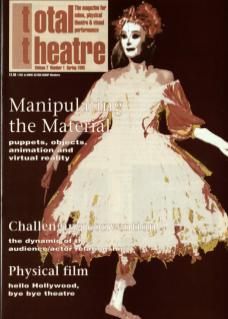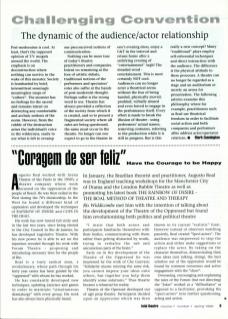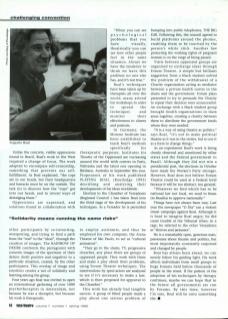Augusto Boal worked with Arena Theatre of São Paulo in the 1950s, a theatre company whose work focused on the oppression of the people of Brazil. He was then exiled in the West during the 70s dictatorship. In the West he found a different kind of oppression and developed the techniques of Rainbow of Desire and Cops in the Head.
His work has now turned full circle and in the last two years, since being elected to the City Council in Rio de Janeiro, he has developed Legislative Theatre. With his new power he is able to act on the injustices revealed through his work with Forum Theatre – proposing and introducing necessary laws for the people of Rio.
Boal is a truly radical man, a revolutionary, whose path through his forty year career has been guided by the ‘oppressed’ with whom he has worked.
He has constantly developed new techniques, updating exercises and games in order to maintain ‘simultaneous dramaturgy’ with every group. His work has also always been physically based.
‘I insist that both actors and participants familiarise themselves with their bodies, communicating with them rather than getting distracted by words, trying to verbalise the sub and unconscious parts of the brain.’
Early on in the development of the Theatre of the Oppressed he was impressed by the work of Che Guevara: ‘Solidarity means running the same risk, you cannot impose your ideas onto others, but together you help them identify some solutions. Thus theatre became a rehearsal for reality.’
Theatre of the Oppressed developed out of agit prop theatre. Participants decided upon an oppression which was then shown in its current ‘realistic’ form. However, instead of observers watching passively, Boal created ‘Spect-actors’. The audience was empowered to stop the action and either make suggestions or replace the actor. By taking on the character themselves, demonstrating their own ideas (not talking, doing), the best solution out of the oppression would be found by common consensus and active engagement with the ‘show’.
Overseeing, encouraging and explaining the rules of the Forum (but not directing) the ‘Joker’ worked as a ‘difficultator’ as opposed to a facilitator, provoking the ‘spect-actors’ into further questioning, acting and action.
Unlike the concrete, visible oppressions found in Brazil, Boal's work in the West required a change of focus. The work adapted to encompass self-censorship, something that prevents our self-fulfilment. As Boal explained, ‘the cops are in our heads, but their headquarters and barracks must be on the outside. The task [is] to discover how the "cops" got into our heads, and to invent ways of dislodging them.’
Oppressions are expressed, and solutions found in collaboration with other participants by reinventing, interpreting, and trying to find a path from the ‘real’ to the ‘ideal’, through the creation of images. The Rainbow of Desire confronts the protagonist with concrete images of the spectrum of their desires (both positive and negative) to a particular situation, created by the other participants. This overlap of image and emotions creates a net of solidarity and learning among the group.
Four years ago Boal was invited to open an international gathering of over 1000 psychotherapists in Amsterdam, not because he was a therapist, but because his work is therapeutic.
‘When you can see psychological problems that you have visually, theatrically you can see how other people feel in the same situation. Always we have the tendency to think we have this problem no one else has, and it's not true.’
Boal's techniques have been taken up by therapists all over the world, many attend his workshops in order to spread the techniques and monitor their effectiveness to clients and patients.
In Germany, the Moreno Institute has been established to teach Boal's methods specifically for therapeutic purposes. Institutes for Theatre of the Oppressed are increasing around the world with centres in Paris, Nebraska, and the latest one opening in Brisbane, Australia in September this year. Proponents of his work published Playing Boal (Routledge 1993) describing and analysing their developments of his ideas worldwide.
Election to the Chamber of Vereadores (Regional Council) has taken Boal into the third stage of the development of his techniques. As a Vereador he is permitted to employ assistants, and thus he employed his own company, the Arena Theatre of São Paulo, to act as ‘cultural animators’.
‘They go to the slums, TV, progressive churches, any place there are groups of oppressed people. They work with them and make a play about their problems, using Forum Theatre techniques. The interventions by spect-actors are analysed to see if it's necessary to make a law, which is then proposed for approval to the Chamber.’
This work has already had tangible success. A group of blind people made a play about one serious problem of bumping into public telephones, The Big Ear. Following this, the council agreed to build platforms around the phones, enabling them to be touched by the person's white stick. Another law protecting the working rights of pregnant women is on the verge of being passed.
Visits between oppressed groups are organised to exchange ideas through Forum Theatre. A simple but brilliant suggestion from a black student solved the problem of the withdrawal of a Charity organisation acting as mediator between a private health centre in the slums and the government. Forum plays presented to try to persuade the Charity to repeal their decision were unsuccessful. An exchange with a black student group brought health organisations in slum areas together, creating a charity between them to distribute the government funds where they were needed.
‘It is a way of using theatre as politics,’ says Boal. ‘It's not to make political theatre as it was in the sixties, but to use it as a form to change things.’
As an experiment Boal's work is being closely observed and monitored by other states and the Federal government in Brazil. Although they did not win a presidential post, the elections in October have made the Worker's Party stronger. However, Boal does not believe Forum Theatre could be used at a Federal level because it will be too abstract, too general.
‘Whatever we find which has to be national law not local, we send to them [to Brasilia] to approve nationally.’
Things have not always been easy. Last year the newspaper O Dia ran a violent smear campaign against Boal. Although it is hard to imagine Boal angry, he did cause trouble at the Tribunal when, in a rage, he referred to the other Vereadores as ‘thieves and jackasses’.
He is a remarkably open, generous man, passionate about theatre and politics, but most importantly constantly surprised and changed by people.
Boal has always been ahead, we can merely follow his guiding light. His work affects individuals from small groups to huge Forums held before thousands of people in the street. If the pattern of the adoption of his techniques by therapy continues, maybe we can hope that in the future all governments are run by Forums. By this time, however, I'm sure Boal will be onto something else. ‘Solidarity means running the same risks.’


